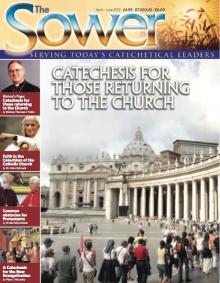For a great variety of reasons, many people who have received the grace of Baptism and Confirmation at a young age, and thereafter were regularly nourished with the sacrament of the Eucharist, do not progress to becoming faithful Catholic adults. The definition of what is sometimes called a ‘practising Catholic’ can be approached from different angles, but the reality is that even many of those children who sat obediently in the pews every Sunday, embraced their faith gladly and had some experience of Catholic family life cannot now be considered ‘practising Catholics’ in any sense. The same is unfortunately true of adults who become Catholics, usually now through the RCIA. Some estimates indicate that as many as 50-70% of new Catholics (neophytes) cease to practise their faith within two years.
Naturally, the reasons for failing to continue living a Catholic life are as diverse as the people who act on them. The pressure of a materialistic culture, constant undermining by family members and friends, or a failure to understand that the Church’s moral teaching is also good news and liberating for the individual; all these and many other factors can result in the drifting away of those who once took a full part in Catholic life. Somehow the Good News has failed to penetrate beyond the mind and to be absorbed within the soul. A sense of being one with Christ and with his Church in the life of the Trinity has stalled somewhere along the way, and the gradual process of transformation into members of Christ’s body has been interrupted.
It is not my purpose here to discuss those many factors which may interrupt a person’s progress more fully into the life of Christ, but rather to look further back at the foundations which underlie the original formation of that person as a Christian. There is insufficient space to outline a systematic and comprehensive approach, but I would like to look briefly at three areas which may contribute to the problem and to show how clear teaching on the identity between Christ and his Church is of foundational importance.
The rest of this online article is available for current Guild members.
This article is from The Sower and may be copied for catechetical purposes only. It may not be reprinted in another published work without the permission of Maryvale Institute. Contact [email protected]

















